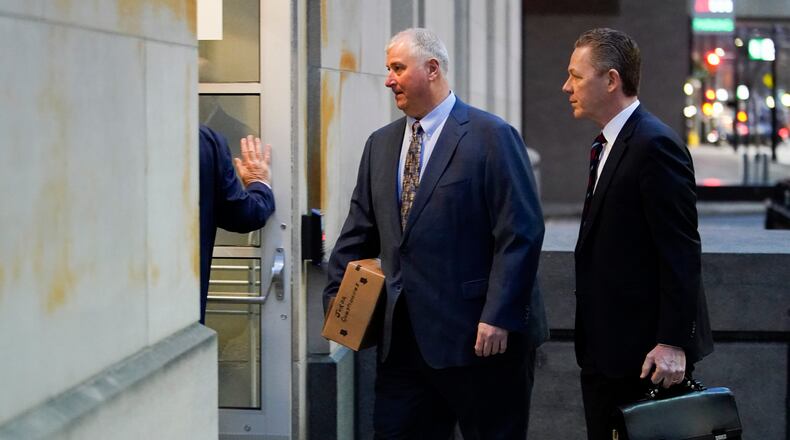Cespedes, a co-defendant with Householder, later pleaded guilty and agreed to cooperate with federal prosecutors in the racketeering trial against the former Ohio House speaker and Matt Borges, a lobbyist and former chairman of the Ohio Republican Party. They are accused of participating in a scheme to use $61 million — most of it from FirstEnergy — to make Householder speaker and then pass a $1.3 billion bailout of failing nuclear and coal plants, most of which were owned by FirstEnergy Services.
Weeks into the trial, Cespedes’s testimony Monday marks the first time a co-defendant or a witness with immunity has testified.
It appears that part of prosecutors’ aim was to show that Householder’s conduct wasn’t just politics as usual, as defense attorneys have argued. Instead, they wanted to show an explicit quid pro quo: that Householder worked for the energy bailout expressly in exchange for the mountain of political money FirstEnergy plowed into a dark money group that he controlled.
Prosecutors seem to have an important legal reason for doing so. In 2016, the U.S. Supreme Court unanimously threw out the bribery convictions of former Virginia Gov. Bob McDonnell and his wife because the court believed the prosecution didn’t do enough to show that the governor undertook an “official act” in exchange for the $170,000 worth of gifts they received from a businessman.
On Monday, Cespedes described how he was hired on contract by FirstEnergy Services in 2018 to figure out why a bailout bill went nowhere in that year’s legislative session. He was also tasked with figuring what could be done to move one in the next.
Cespedes assessed that Householder, who was gunning to be made speaker in the 2019 House session, would be more sympathetic to the company’s needs than then-Speaker Ryan Smith, who is also a Republican.
In a meeting on Aug. 1, 2018, Householder told FirstEnergy Services lobbyist Klaffky that he would need “multiple hundreds of thousands of dollars” to help get his slate of lawmakers elected so they could make him speaker, Cespedes testified. Klaffky “pushed back and said, ‘This is a company in bankruptcy,’” Cespedes said, explaining that his team would need to find another mechanism to get Householder the money he needed without the bad optics.
Ultimately, much of it would travel through Generation Now, a dark money group that Householder controlled and that didn’t have to disclose where its money came from.
After the meeting, FirstEnergy officials decided that they would initially give Householder $500,000, but Klaffky said they would split it into payments of $400,000 and $100,000.
“I think that amount was far more than (Householder) expected,” Cespedes said.
So Householder got the first $400,000 in the unofficial State Street office Householder shared with Generation Now. The FirstEnergy Services lobbyists held back the remaining $100,000 “because we wanted another chance to get in front of him and show our support,” Cespedes testified.
He explained that it was important to his team that there be no confusion.
“We were trying to establish the fact that our support was specifically tied to the legislation,” Cespedes said.
It seems likely that Assistant U.S. Attorney Matthew Singer elicited that testimony to show that Householder took what would become millions of FirstEnergy dollars into the Generation Now account expressly in exchange for passing the bailout legislation — the sort of official act the Supreme Court said wasn’t demonstrated in the McDonnell case.
Another part of Cespedes’s testimony seems to demonstrate that some of the actors in the bailout drama believed what they did might have been on the shady side.
Pat Tully was a senior policy advisor to the state’s utility regulator, the Public Utilities Commission of Ohio in early 2019, when he sent his resume to an official with a company he was supposed to be regulating — FirstEnergy lobbyist Ty Pine. Pine forwarded it to Householder’s political strategist and soon Tully was senior energy advisor to the House Republican Caucus.
There was testimony on Friday about how Tully and PUCO Chairman Sam Randazzo worked together on the bailout legislation even though it would seem improper for the state’s top regulator to involve himself in such a project. But even more suspicious is that Randazzo took $4.3 million from FirstEnergy just as he was being appointed by Gov. Mike DeWine to chair the commission, the company said in a deferred prosecution agreement.
On Monday, Cespedes described how he also worked with Tully on the legislation, House Bill 6.
“Mr. Tully did not want to have email or an electronic trace of us sending information back and forth,” the FirstEnergy Services lobbyist testified, explaining how they exchanged dozens of hard copies of the legislation.
“I found it to be extremely odd behavior,” Cespedes said. “But I understood why.”
About the Author
